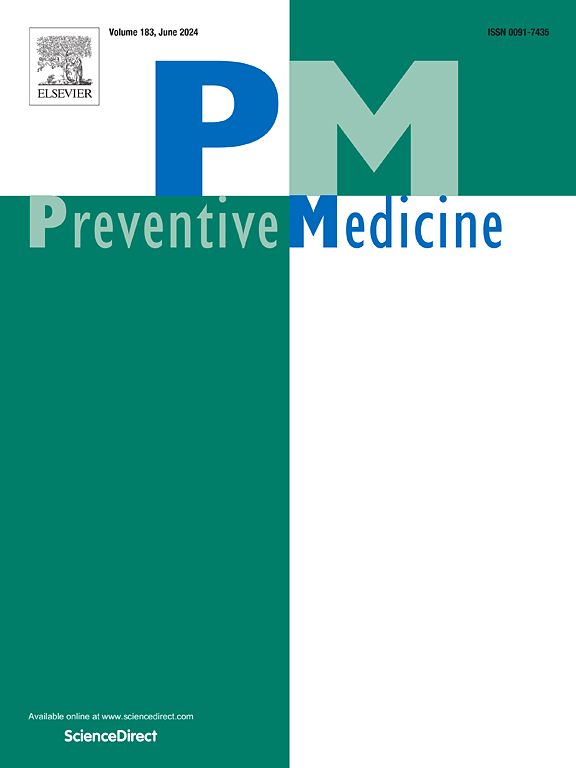Emotional barriers pose the greatest threat to cervical cancer screening for young adult women in the United Kingdom
IF 4.3
2区 医学
Q1 MEDICINE, GENERAL & INTERNAL
引用次数: 0
Abstract
Objective
Low cervical screening coverage rate is the root-cause of cervical cancer mortality in the United Kingdom (UK), with 99 % of deaths being considered preventable. Research has consistently categorised reasons for non-attendance into emotional, practical, and cognitive barriers. Despite this, public health interventions have been unable to improve coverage rates. We propose a lifespan perspective is needed, to enable targeted interventions at appropriate milestones (i.e., common life events) during a woman's life. We start this lifespan perspective by investigating the perceived barriers young women report, who have and have not yet been invited to their first cervical screen (i.e., a common life event).
Methods
Twenty-nine women not yet invited to their first cervical screen and twenty women who confirmed they received their invite and confirmed attendance status, rated the likelihood of emotional, practical, and cognitive barriers affecting their attendance at their next cervical screen. Data collected between January and April 2018.
Results
Women who did not attend their first screen, rated emotional barriers significantly higher than all groups, and cognitive barriers higher than those women who did attend. Results highlight, for the first time, that commonly reported barriers are present up to seven years prior to a woman's first eligible cervical screen, with emotional barriers rated most strongly.
Conclusion
Emotional barriers pose the greatest threat to cervical screening attendance in young adult women. Interventions should start at school to encourage cervical screening to be viewed as routine healthcare. Future research should continue a lifespan perspective, indexed to common life events.
在英国,情感障碍是对年轻成年女性进行宫颈癌筛查的最大威胁。
目的:宫颈癌筛查覆盖率低是导致英国宫颈癌死亡的根本原因,其中 99% 的死亡被认为是可以预防的。研究一直将不参加筛查的原因分为情感障碍、实际障碍和认知障碍。尽管如此,公共卫生干预措施仍无法提高覆盖率。我们提出需要从生命周期的角度出发,在妇女一生中适当的里程碑(即常见的生命事件)上采取有针对性的干预措施。我们从生命周期的角度出发,调查了已经和尚未被邀请进行首次宫颈筛查(即常见的生命事件)的年轻女性所反映的感知障碍:29名尚未受邀参加首次宫颈筛查的女性和20名确认收到邀请并确认出席情况的女性,对影响她们参加下一次宫颈筛查的情感、实际和认知障碍的可能性进行评分。数据收集时间为 2018 年 1 月至 4 月:未参加首次筛查的妇女对情感障碍的评分明显高于所有组别,对认知障碍的评分高于参加筛查的妇女。结果首次强调,在妇女首次接受合格宫颈筛查之前的七年内,普遍报告的障碍都存在,其中情感障碍的评价最高:结论:情感障碍对年轻成年女性参加宫颈筛查构成了最大的威胁。干预措施应从学校开始,鼓励将宫颈筛查视为常规保健。未来的研究应继续从生命周期的角度出发,以常见的生活事件为索引。
本文章由计算机程序翻译,如有差异,请以英文原文为准。
求助全文
约1分钟内获得全文
求助全文
来源期刊

Preventive medicine
医学-公共卫生、环境卫生与职业卫生
CiteScore
7.70
自引率
3.90%
发文量
0
审稿时长
42 days
期刊介绍:
Founded in 1972 by Ernst Wynder, Preventive Medicine is an international scholarly journal that provides prompt publication of original articles on the science and practice of disease prevention, health promotion, and public health policymaking. Preventive Medicine aims to reward innovation. It will favor insightful observational studies, thoughtful explorations of health data, unsuspected new angles for existing hypotheses, robust randomized controlled trials, and impartial systematic reviews. Preventive Medicine''s ultimate goal is to publish research that will have an impact on the work of practitioners of disease prevention and health promotion, as well as of related disciplines.
 求助内容:
求助内容: 应助结果提醒方式:
应助结果提醒方式:


